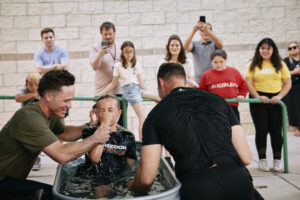About those shepherds …
MAYFIELD, Ky. (BP) -- The account of the shepherds in Luke's nativity passage (Luke 2:8-20) continues to fascinate modern readers. Receiving an angelic message that the Messiah was born in nearby Bethlehem, these shepherds left their closely guarded flocks of sheep to seek the good news themselves. Theologians tell us that the angel's message represented God's annunciation of his Son's birth to the common people of Israel, but who were these shepherds? The shepherds of Bethlehem persisted in an honorable occupation that also claimed various Old Testament figures, including Abel, Abraham, Isaac, Jacob, Rachel, Moses, David, Job and Amos -- just to name a few. They largely kept flocks of the broad-tailed sheep (ovis laticaudata) that can still be found in the Holy Land today. Allusions to the highly prized "fat tail" of these sheep can be found in Exodus 29:22 and Leviticus 3:9. In terms of their daily and nightly chores, shepherds were responsible for grazing and watering their charges, protecting them from human theft and animal predation, shearing the sheep at the appropriate time, milking them for dairy products and providing them for ritual sacrifices and/or human consumption during important feasts. As a general rule, dairy-producing and wool-producing sheep were too valuable to be a daily menu item. Although the Old and New Testaments ascribe great personal honor to the men and women of this occupation, the shepherds of the era of Christ's birth appeared to be less honored in the Jewish tradition. The rabbis who produced the Talmudic literature (written around A.D. 200-500 but containing oral traditions from before, during and after the earthly lifetime of Jesus) often regarded shepherds as dishonest and prone to violating Jewish law. Likewise, Philo, a Jewish sage in Egypt and a contemporary of Jesus, wrote that shepherds "are held to be mean and inglorious" (On Husbandry, 61). Nevertheless, God often uses unlikely vessels to further His will. According to the Jewish Mishnah (A.D. 200 but also containing longstanding oral traditions of previous ages), animals in the vicinity of Bethlehem (specifically Migdal Eder -- "Tower of the Flock") could be offered for Temple sacrifices (Shekalim 7:4). According to Eusebius, a Palestinian Christian leader of the fourth century in his work, "Concerning the Place-names in Sacred Scriptures" (Section B, 196), Migdal Eder was located one Roman mile east of Bethlehem (a Roman mile of 1,000 paces is a little short of our mile by 143 yards). If the shepherds of Luke's account were those who kept flocks potentially destined for the Temple at Migdal Eder, they especially would have been receptive to the angel's message. Both the geographical locations of Bethlehem and nearby Migdal Eder are mentioned in Micah's prophecy of the Messiah (Micah 5:2 and 4:8). In regard to Migdal Eder, this locale too is linked to the coming of the King. If the shepherds tending the flocks for the Temple stationed at Migdal Eder constitute the shepherds of the Luke account, then the annunciation to the shepherds would fulfill that aspect of messianic prophecy. When the angel of the Lord appeared to these shepherds, accompanied by a great light (Luke 2:9), their first reaction was sheer terror. Nevertheless, the angel calmed them and told them that the Messiah had just been born in nearby Bethlehem. While not revealing the exact location in the city for the child, the angel related that the child was the one swaddled in binding cloths and lying in a manger (v. 12). After the angel was briefly joined by a heavenly host that praised God, they left the shepherds. The befuddled shepherds, however, decided to view the Christ child. They could not pass up the opportunity to view the "Lamb of God." After a short walk to the city (only about one mile if Eusebius is correct), they found the child with his parents. They not only praised God for both the angelic message and visit with the child, they shared this news with others (v. 17-20). Those hearing this account by the shepherds also were amazed. The annunciation to the shepherds of Bethlehem demonstrated God's love for the common people. Previous annunciations of the Lord's birth had occurred only to family members like Mary, Joseph, Zechariah and Elizabeth. The first annunciation to those outside of the family were not to the priestly establishment in Jerusalem or those of Herod's royal house or to the rich landowners of Judea but rather to these common shepherds whom the rabbinic tradition had tarnished. Indeed, the good news was not to be a respecter of persons. Simple shepherds, like the later fishermen and farmers among the disciples of Jesus, would be both the recipients and purveyors of the Gospel. Today many shepherds in the Bethlehem area and in other parts of Israel/Palestine still seek and profess Christianity, and their stories can be located on the Internet and in the popular press. In the 20th and 21st centuries, many of them achieved some recognition from the evangelical Christian community in the United States.
FIRST-PERSON: What’s a Christian to do with Halloween?
College professor Stephen Douglas Wilson recounts the centuries-old issue that Christians have faced: What do we do with Halloween?
FIRST-PERSON: What’s a Christian to do with Halloween?
College professor Stephen Douglas Wilson recounts the centuries-old issue that Christians have faced: What do we do with Halloween?
FIRST-PERSON: Are we prepared to reach the ‘globals’?
The "globals" generation -- young 20- and early 30-somethings -- display various characteristics relatively new to American culture, college professor Stephen Douglas Wilson writes on the challenge facing older Christians in imparting their faith to an emerging global, secular-minded generation.
FIRST-PERSON: Are we prepared to reach the ‘globals’?
The "globals" generation -- young 20- and early 30-somethings -- display various characteristics relatively new to American culture, college professor Stephen Douglas Wilson writes on the challenge facing older Christians in imparting their faith to an emerging global, secular-minded generation.
Easter, a worldly holiday? 100 years ago, Southern Baptists thought it was
MAYFIELD, Ky. (BP) -- Southern Baptists originally did not attach much significance to Easter. This was much the same regarding Christmas (see Southern Baptists have not always embraced Christmas in Baptist Press, Dec. 23, 2011).
FIRST-PERSON: The shamrock — an embattled Christian symbol?
Products such as Irish Spring soap once had three-leaf shamrocks on the box but have since replaced them with four-leaf clovers. Columnist Stephen Douglas Wilson wonders: Why is so much of the world abandoning what was once a popular symbol for the Trinity?
Southern Baptists have not always embraced Christmas
MAYFIELD, Ky. (BP) -- Baptists of the South and the faith community of Southern Baptists after 1845 originally did not attach much significance to Christmas. The holiday is not recognized as a special day of worship in any of the historic Baptist confessions, allusions to it are rare in Baptist history volumes before the 1880s, and the holiday possessed an association with worldliness and even paganism in the minds of many Baptist ministers. Such opinions can still be found among some Baptists today who voice, "The New Testament does not command us to celebrate a festival commemorating the nativity." [QUOTE@left@160= After the Civil War, Southern Baptists began a slow process of incorporating Christmas themes and activities into their church programs and services.]Nevertheless, according to Southern Christmas historian Emyl Jenkins, the people of the South had a long tradition of celebrating the holiday as a popular festival to honor the birth of Christ. At a time when Christmas was slow coming to New England (Boston did not celebrate Christmas until 1856), Southerners had made it a legal holiday in most states beginning with Alabama, Arkansas and Louisiana in the 1830s. Southern communities and families observed the holiday with great enthusiasm. Included in these celebrations were distinctive regional customs such as the popular consumption of pork (over poultry); the broader use of almost anything green in nature for decorations besides holly, evergreens, and mistletoe; discharges of firearms; fireworks; and bonfires. These celebratory activities took place alongside more thoughtful observances of the Lord's nativity. It is probable that while most Baptists in the South before the Civil War largely downplayed the observance of Christmas in their churches, they participated in Christmas activities with their families and in their communities. These Baptists exercised their Christian liberty about special days that Paul cited in Romans 14:5-6 and found festive but temperate activities and customs to celebrate the birth of Christ. [QUOTE@right@180= A second reason for the embrace of Christmas in Southern Baptist culture was the influence of missionary Charlotte Digges "Lottie" Moon.]After the Civil War, Southern Baptists began a slow process of incorporating Christmas themes and activities into their church programs and services. One reason for this was the growing popularity of Christmas during the Victorian Era. Churches sang carols, implemented Christmas-themed nativity plays and holiday events staged for and by children, and created a series of sermons based on the Matthew and Luke accounts of the birth and early childhood of Jesus as valid means for proclaiming the Gospel and teaching the doctrine of the incarnation to all ages of Believers. For instance, in 1867 Southern Baptist Theological Seminary professor Basil Manly Jr. wrote a letter to his children relating how his church's Sunday School program celebrated the holiday with a decorated tree and the exchange of inexpensive gifts. Manly specifically stated that this custom had only taken place in his church after the Civil War, and the letter itself bore evidence of the growing tolerance for Christmas activities in church programs. A second reason for the embrace of Christmas in Southern Baptist culture was the influence of missionary Charlotte Digges "Lottie" Moon. In 1887 she wrote a letter to the Foreign Mission Journal suggesting that Southern Baptist women set aside a season of prayer and giving to international missions. She pleaded that the "week before Christmas" be chosen. "Is not the festive season when families and friends exchange gifts in memory of the Gift laid on the altar of the world for the redemption of human race, the most appropriate time to consecrate a portion from abounding riches … to send forth the good tidings of great joy into all the earth?"
5 junctures in U.S. history for which we can be thankful
MAYFIELD, Ky. (BP) -- On this Thanksgiving our formal prayers will almost certainly include a reference about "living in a free country." Indeed, we have much to be thankful for in this regard. Nevertheless, we often fail to recognize the Almighty's hand in American history. We have been impacted by God's special hand in promoting American exceptionalism. The American experience has been unique, and while we make no claims about God's future blessings on the United States, we can see His intervention at various junctures in our past to both ensure His will and promote blessings for the American people. [QUOTE@left@150='We Americans have much for which to be thankful, and we should be reminded of how the Lord blessed our nation at various points in our history.']In fact, it is hard to choose just five junctures in American history for which Americans should be thankful, and many Christian historians of American history will certainly disagree about my choices. Yet, these junctures both molded the American experience and have given us long-term blessings. We can be very thankful that the Almighty was present in all these junctures. 1. The founding and settlement of the American colonies by religious dissenters. America's early social, political, economic, moral and religious roots owe much to the founding of many American colonies by religious dissenters. The dissenters themselves often disagreed with each other about many issues, but collectively they established the American Christian worldview that has persisted to our own era and helped mold the American character. This is especially true of the early American groups like the Pilgrims, Puritans, Pietists, Quakers and Baptists. A partial list of the contributions of these religious dissenters to the American character would include: a recognition that God plays a central role in our lives; the relationship of faith to the exercise of government (The Mayflower Compact); a view that earthly society should reflect as much as possible an example for the rest of the world (Puritan John Winthrop's "City on a Hill"); the Puritan (or Protestant) work ethic; an economic consensus that God blesses thoughtful non-exploitive investment, saving, and business growth; a charitable concern for fellow citizens as a means of also worshipping God; a sense of duty and service to both God and fellow citizens; the promotion of temperance in daily living that avoids both extreme self-denial and self-indulgence and is good for both the individual and society; and the advocacy of religious liberty and the separation of church and state (for which Baptists played a very unique role). While Christians in the United States today still hold to these principles, even non-Christians in America have been influenced by the legacy of the early American religious dissenters. Our gratitude for their influence is certainly worth remembering during this season of Thanksgiving. 2. The American Revolution and constitutional guarantees of freedom. God's blessings for the American people had their origins in the creation of the republic. The United States began because of a long revolution. In 1776 it was not always clear that a country without a sovereign could succeed. Nevertheless, the determination of American military men and the help of the French played a decisive part in ensuring God's will for the independence of the American nation.
FIRST-PERSON: Why mothers are worth celebrating
An administrator at a Christian college recounts the importance of mothers to their children, to the culture and to the Christian faith











